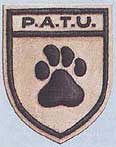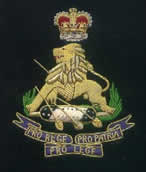BSAP Home BSAP Mounted Unit Police Reserve Air Wing Rank Structure and Badges of Rank Roll of Honour
A HISTORY OF THE BRITISH SOUTH AFRICA POLICE OF SOUTHERN RHODESIA
The history of the British South Africa Police is mirrored in the history and development of Southern Rhodesia. The police force that accompanied and guarded Cecil Rhodes’ Pioneer Column from South Africa in 1890, that carved its way through the overgrown bush, across vast grassy plains and over wide, meandering rivers, up into the heart of the land lying between the Limpopo and Zambezi rivers, was the kernel of a body of men and women who were to police its towns, villages and kraals and guard its hundreds of miles of borders for virtually ninety years.
The BSAP remained ‘the first line of defence’, the sole established military unit in Southern Rhodesia for fifty years. Although a sprinkling of its members were drawn into the Southern Rhodesia Staff Corps in the thirties and thus formed the nucleus of what was to become, in very broad terms, the Rhodesian Army, it was members of the BSAP, both black and white who fought against the Germans in both German East and West Africa during the First World War. Over twenty years later many members of the Police served in East Africa, the Mediterranean and Middle East during the Second World War. The BSAP, traditionally and proudly held the position of “Right of the Line".
It was stated at the beginning that the Police mirrored the development of the country. It must be remembered that Southern Rhodesia was an essentially rural, economically undeveloped region from 1890 until the end of the Second World War. Such commerce and industry as existed was related to and developed from the agricultural backbone of the economy. After 1945 this all changed. Rhodesians had made a significant contribution to the Armed Forces of the British Empire whilst the country itself had established eleven Air Training Centres for air and ground staff in the Royal Air Force, as well as housing several thousand German and Italian internees. Rhodesia was on the map and the post-war years saw the potential of the rich and promising land developed to the full.
The growth of the country corresponded with the growth of its’ police force. As hundreds of recently demobbed and adventurous young men sought a new life away from the hardships of post-war Britain, so Southern Rhodesia, as well as Australia, New Zealand and other parts of the Commonwealth were to benefit from their skills and enterprise. Rhodesia catapulted forward to become a thriving and viable nation. The BSAP followed a similar course.
Three men were mainly responsible for the development of the Police in those post war years. John Ross, who became Commissioner of Police in 1945; Jim Appleby, who succeeded him five years later, and Basil Spurling who took command in 1958. These three were the architects of a remarkable police force. Under their tutelage modern, streamlined policing methods were introduced, police stations built to provide the needs of all sections of the community, radio links established and developed, detection methods advanced and finely honed, training improved and modernised, and suitable transport made available. Every advantage was taken of the experience obtainable from other forces, be they in Britain, the United States or elsewhere on the African continent. The BSAP attained a crime clearance rate that rivalled and often bettered that of other long established Forces.
But the writing was on the wall although perhaps the print was too small for all to see.
In the early 1960’s African Nationalism started agitating for what its leaders portrayed as freedom. The declaration of UDI in 1965 aggravated the position. Encouraged and armed by the communist bloc of states they started a cruel, grim and vicious campaign against the Government, forces of law and order and law-abiding citizens of all races.
Throughout this period, the Police had to adopt a different role. Whilst still maintaining the law of the land they now had to revert to their paramilitary roll to deal with what was referred to as terrorism. As activities increased, the BSA Police were now assisted by the other Rhodesian Forces, the Army and the Air Force assuming their proper roles.
The activities of the Nationalists were in the main ‘criminal’ and the BSAP treated them as such. The Police Reserve, civilians who voluntarily assisted the regular force, was bought into full use, and National Service was introduced to provide additional trained manpower.
Terror tactics used by the Nationalists demanded very different skills and tactics to normal police work. In 1966 PATU (Police Anti Terrorist Unit) was formed to carry out these special duties.
As the war escalated the combat duties of the BSAP expanded and several new units were formed for special anti-terrorist duties.
These included:
1 The highly succesful Support Unit, known as the Black Boots
2 The SB Scouts, a special branch unit of special agents for intelligence gathering
3 The BSAP Mounted Unit
4 Urban Emergency Unit to task urban terrorism
 The PATU badge shown here which was based on a lion's spore, was awarded to PATU men once they had proved themselves on Operations.
The PATU badge shown here which was based on a lion's spore, was awarded to PATU men once they had proved themselves on Operations.
When South Africa joined the rest of the world and abandoned Rhodesia in the late eighties, the struggle came to an end and the BSAP was consigned to History.

















